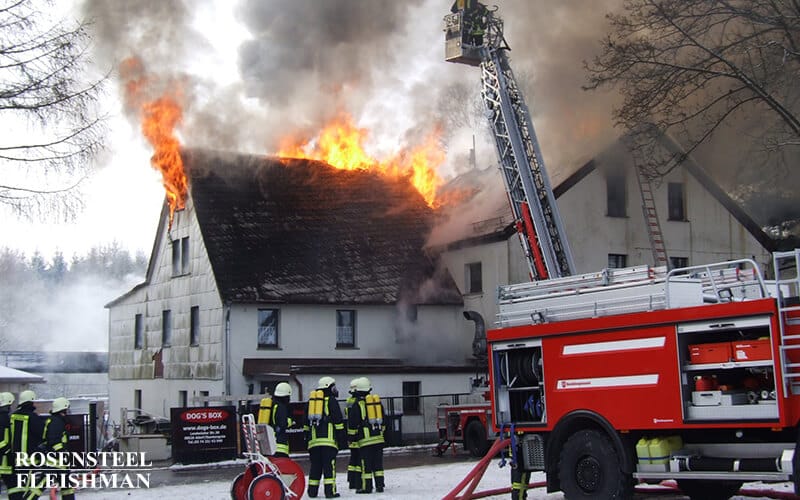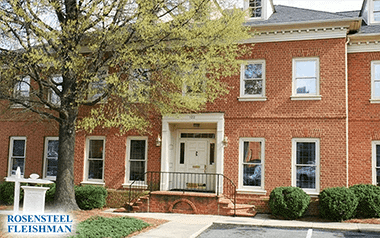Criminal Defense Lawyer for Arson Charges

Arson is a serious crime which is punished at the felony level and for which you can spend years in prison. If you have been charged with arson, an experienced defense attorney can help determine how the law applies to your case and potentially negotiate with a prosecutor for a dismissal or reduced charge. Call Mr. Rosensteel so that he can determine the best course of action for you.
Consult a Charlotte Arson Lawyer
The crime of arson is a common law crime which requires that a person maliciously burn the dwelling house of another. North Carolina statute has created crimes for the burning of certain buildings and structures which are not included in this definition of arson. These crimes include fraudulently setting fire to one’s own dwelling house, as well as the burning of structures other than dwelling houses.
Arson requires that a person burn the dwelling house of another. But this does not mean that people can go around burning their own dwelling houses without consequence. Instead of falling under the crime of arson, when a person burns his own dwelling house, he commits fraudulently setting fire to dwelling houses. To show that a person fraudulently set fire to a dwelling house, the following elements must be proven:
- the defendant intentionally set fire to, burned or caused the burning of a structure
- this structure was used as a dwelling house and occupied by the defendant or designed or intended for use as a dwelling house and owned by the defendant
- the defendant did so wantonly and willfully, that is, intentionally and without justification or excuse, with the knowledge or reasonable grounds to believe his act would endanger the rights or safety of others or for the fraudulent purpose of obtaining something of value from another by means of an intentional misrepresentation of the truth of the burning
First Degree Arson
To show that a person has committed first degree arson, the following elements must be evidenced:
- the defendant burned a structure
- this structure was a dwelling house
- this structure was the dwelling house of someone other than the defendant
- this structure was occupied when the defendant burned it, that is, that some person was physically present in the structure at that time
- the defendant did so maliciously, that is, that he intentionally and without justification or excuse burned the structure or burned another structure, and that as a proximate result of his act, the fire spread to the dwelling house structure
A person who commits first degree arson is guilty of a Class D felony. North Carolina law provides that anyone who commits a Class D felony must receive a sentence ranging from 38 to 160 months, depending on prior convictions. Anyone who has committed a Class D felony must be sentenced to active jail time.
Second Degree Arson
A person who commits second degree arson is guilty of a Class G felony. A Class G felony is punishable by a sentence ranging from eight to 31 months, depending on prior convictions. A person with no prior convictions may receive an intermediate punishment, but a court is permitted to sentence anyone who has committed a Class G felony to active jail time.
To show that a person has committed second degree arson, the following elements must be evidenced:
- the defendant burned a structure
- this structure was a dwelling house
- this structure was the dwelling house of someone other than the defendant
- the defendant did so maliciously, that is, that he intentionally and without justification or excuse burned the structure or burned another structure, and that as a proximate result of his act, the fire spread to the dwelling house structure
Dwelling House
A dwelling house is defined as a house that is inhabited, meaning that someone lives there. Inhabitation can be permanent, temporary or seasonal and does not require actual occupation. However, if the house is under construction and no one has moved in yet, between tenants or abandoned, it is not inhabited and therefore not a dwelling house. Under North Carolina law, a dwelling house includes mobile homes, manufactured-type houses and recreational trailers.
For the purposes of arson, a dwelling house includes outbuildings within the curtilage of the dwelling house. The curtilage is the grounds around the dwelling house which is commonly used with the dwelling house, such as a house’s yard. The curtilage can be enclosed or unenclosed.
Burning
To prove the element of burning, a partial burning or even the slightest charring is sufficient evidence. However, North Carolina courts have held that a “mere discoloration” is not sufficient evidence of a burning. A “burning” of a dwelling house is also distinct from “setting fire to” a dwelling house, and the two terms have different meaning in the context of the crime of arson.
Dwelling House of Another
This element is shown when the dwelling house is inhabited by anyone other than the defendant, even if the dwelling house is also inhabited by the defendant. So if a single unit dwelling house is occupied by the defendant and the defendant’s spouse, children or roommates, the defendant commits arson when he burns that house.
A single-unit dwelling house can be solely owned by the defendant but still be the dwelling house of another. For example, if the defendant is a landlord and rents the house to a tenant, the landlord can commit arson by burning that house. However, if the tenant burns the house, he does not commit arson unless another person lives there in addition to him. In addition, if one spouse exclusively occupies a house and the other spouse burns the house, the spouse that burns the house commits arson even if the title to the house is only in his name. But if the spouse who exclusively occupies the house burns the house, that spouse does not commit arson when he burns the house.
If the dwelling house is a multi-unit dwelling, the defendant can commit arson by burning his own apartment so long as there is at least one other unit in the building that is inhabited by someone else, even if the fire does not spread to any unit other than the defendant’s. If there is no other inhabited unit in the building and the defendant’s unit is inhabited by only himself, however, the defendant does not commit arson when he burns his unit.
Maliciously
The crime of arson requires that a person act maliciously, which means that the defendant either intentionally and without justification or excuse burned the dwelling itself, or that the defendant intentionally and without justification or excuse burned another structure or place that was not the dwelling itself but created an unreasonable danger of fire to the dwelling. North Carolina courts have explained that the malicious element of the crime of arson does not require an “intent or animus” against either the dwelling or the owner of the dwelling.
Fraudulently Setting Fire to a Dwelling House
If a person is found guilty of fraudulently setting fire to a dwelling house, he is guilty of a Class H felony. A person who commits a Class H felony must be sentenced to punishment between four and 25 months, depending on prior convictions. A person with no prior convictions may receive community or intermediate punishment, such as probation. However, any person who commits a Class H may receive active jail time as punishment.
A dwelling house is defined as a house that is inhabited, meaning that someone lives there. Inhabitation can be permanent, temporary or seasonal and does not require actual occupation. However, if the house is under construction and no one has moved in yet, between tenants or abandoned, it is not inhabited and therefore not a dwelling house. Under North Carolina law, a dwelling house includes mobile homes, manufactured-type houses and recreational trailers.
A person does not have to own the house for that house to be his dwelling house. For example, a tenant would commit fraudulently setting fire to a dwelling house, not arson, when he burns a dwelling house of which he is the sole inhabitant.
For the purposes of burning crimes, a dwelling house includes outbuildings within the curtilage of the dwelling house. The curtilage is the grounds around the dwelling house which is commonly used with the dwelling house, such as a house’s yard. The curtilage can be enclosed or unenclosed.
The crime of fraudulently setting fire to a dwelling house includes both the act of burning the dwelling house and the act setting fire to the dwelling house. To prove the element of burning, a partial burning or even the slightest charring is sufficient evidence. However, North Carolina courts have held that a “mere discoloration” is not sufficient evidence of a burning. A “burning” of a dwelling house is distinct from “setting fire to” a dwelling house, and the two terms have different meanings. Setting fire to a dwelling house means causing fire to come into contact with the property, even if the property is not actually burned, and does include circumstances when the property is “merely scorched” or “discolored by heat.”
A person does not have to actually burn or set fire to his dwelling house to violate the fraudulently setting fire to a dwelling house statute. The statute also makes it a crime for a person to “aid, counsel or procure” the burning of his dwelling house.
Other Burnings
North Carolina statute also creates distinct crimes for the burning of or setting fire to certain other buildings. Like the fraudulently setting fire to a dwelling house statute, these statutes do not require a person to actually burn or set fire to the structure and make it a crime for a person to “aid, counsel or procure” the burning of these structures.
The burnings of or setting fire to State buildings, schools, uninhabited houses, offices, or warehouses are punishable as a Class F felony. A person who commits a Class F felony must be sentenced to punishment between 10 and 41 months, depending on prior convictions. A person with no prior convictions may receive intermediate punishment, but any person convicted of a Class F felony may receive active jail time.
The burning of or setting fire to churches is punishable as a Class E felony. A person with no prior convictions who is found guilty of a Class E felony receives a sentence between 15 and 31 months of imprisonment. However, prior convictions can increase the sentence to up to 63 months. A person with no prior convictions may receive intermediate punishment, but any person convicted of a Class E felony may receive active jail time.
The burning of or setting fire to a building or structure in process of construction or the burning of or setting fire to boats is punishable as a Class H felony. A person who commits a Class H felony must be sentenced to punishment between four and 25 months, depending on prior convictions. A person with no prior convictions may receive community or intermediate punishment, such as probation. However, any person who commits a Class H may receive active jail time as punishment.
Speak to a Charlotte, NC Arson Lawyer Today
Arson is a serious crime that is punishable by severe consequences. If you have been accused of arson or another burning crime, it is important to seek the guidance of an experienced Charlotte, NC arson lawyer. The criminal defense attorneys at Rosensteel Fleishman Car Accident & Injury Lawyers have extensive experience representing clients who have been charged with arson and other related crimes. They have the knowledge and skills needed to help you navigate the complex legal system and to protect your rights and freedoms.
When you contact Rosensteel Fleishman, you will receive a free initial consultation with one of their experienced arson lawyers. During this consultation, you can discuss your case and learn more about your legal options. The attorneys at Rosensteel Fleishman understand that each case is unique and that there is no one-size-fits-all approach to criminal defense. They will work with you to develop a strategy that is tailored to your individual needs and goals.
The attorneys at Rosensteel Fleishman are dedicated to helping their clients achieve the best possible outcome in their cases. They will work tirelessly to protect your rights and to ensure that you receive the compensation you deserve. If you have been charged with arson or another burning crime, call Rosensteel Fleishman Car Accident & Injury Lawyers today at (704) 714-1450 to discuss your options.

